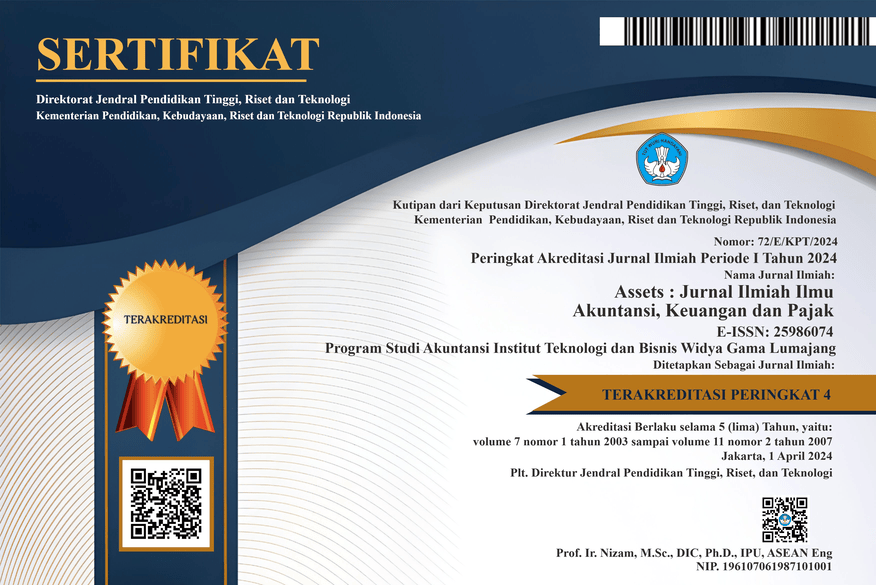Evaluation of Deconcentration Funds in the Regional Development Planning Agency (Bappeda) Central Java Province
DOI:
https://doi.org/10.30741/assets.v6i2.879Keywords:
APBN, CSE-UCLA, Deconcentration FundAbstract
Deconcentration funds are one form of the central government to hold an equitable government in each region using the State Revenue and Expenditure Budget (APBN). The implementation of this deconcentration fund is directly supervised by the governor as a representative of the central government which is included in vertical agencies. The research method used in this journal is the CSE-UCLA evaluation model with research approach used using a qualitative approach with documentation, interviews, and observation methods. Most of the data taken are from the results of documentation studies with data analysis techniques, namely data reduction, data presentation, and conclusion. In the use of deconcentration funds in the Central Java Province for the budget year 2021, which is Rp. 1,144,613,000, - (one billion one hundred forty-four million six hundred thirteen thousand rupiah) which among others is used for expenditure on operational goods, expenditure on non-operational goods, expenditure on supplies, service expenditure, and expenditure on domestic business trips. In its implementation, two obstacles occur. The first obstacle is the change in administrative requirements for disbursing deconcentration funds. The second obstacle occurred because of the COVID-19 pandemic, so there were several activities whose implementation was delayed until the situation could be said to be safe to carry out activities.
Downloads
References
Afandi, M. N., Anomsari, E. T., & Novira, A. (2021a). A Conceptual Model of Localizing the SDGs : Lesson Learned from the Local Development Plan and Practice in Indonesia. Review Of International Geographical Education, 11(8), 1707–1716. https://doi.org/10.48047/rigeo.11.08.147
Afandi, M. N., Anomsari, T., & Novira, A. (2021b). Sustainable Development Goals (SDGs) Perspective in Regional Development Planning and Implementation (The Case of Bandung Regency, West Java, Indonesia). Advances in Social Science, Education and Humanities Research, 564(Proceedings of the 2nd International Conference on Administration Science 2020 (ICAS 2020)), 43–47.
Iqbal, M., Rachman, D., & Rodiah, S. (2021). Pengaruh Rencana Anggaran dan Realisasi Anggaran Pendapatan dan Belanja Daerah (APBD) Terhadap Kinerja Keuangan Pemerintah Daerah Pada Badan Keuangan dan Aset Daerah. Jurnal Ilmiah Akuntansi, 12(2), 18–34.
Labi, A. (2019). Analisis Kinerja Anggaran Pendapatan Dan Belanja Daerah Pada Pemerintah Daerah Kabupaten Pulau Morotai Periode 2013-2015. Jurnal Akuntansi Dan Keuangan, 5(1), 1355–1370. https://doi.org/10.36448/jak.v11i1.1393
Lukiana, N., & Budiwati, H. (2011). Pengaruh Dana Ekonomi Bergulir Proyek Penanggulangan Kemiskinan di Perkotaan (P2KP) Terhadap Peningkatan Pemberdayaan Masyarakat di Kabupaten Lumajang. Wiga: Jurnal Penelitian Ilmu Ekonomi, 1(1), 13–24.
Pamungkas, B. (2018). Evaluasi Implementasi Anggaran Belanja Sebagai Sarana Pertanggungjawaban Pelaksanaan APBD. Jurnal Ilmiah Akuntansi Kesatuan, 1(1), 001–008. https://doi.org/10.37641/jiakes.v1i1.39
Pradesa, H. A., Agustina, I., Taufik, N. I., & Mulyadi, D. (2021). Stakeholder Theory Perspective in the Risk Identification Process in Village Government. Jurnal Ilmu Manajemen Advantage, 5(1), 17–27. https://doi.org/10.30741/adv.v5i1.665
Rachman, G., Sarma, M., & Rachmina, D. (2020). Strategi Perbaikan Penyerapan Anggaran Belanja Pemerintah Kota Bogor. Jurnal Manajemen Agribisnis, 8(2), 207–219.
Rahmawati, R. S., & Ishak, J. F. (2020). Analisis Faktor – Faktor Yang Mempengaruhi Penyerapan Anggaran Belanja Pada Pemerintah Kota Cimahi. Indonesian Accounting Research Journal, 1(1), 180–189.
Salamah, S. (2018). Strategi Penyerapan Anggaran Pendapatan dan Belanja Daerah (APBD) Pemerintah Provinsi Jawa Tengah. Economics Development Analysis Journal, 7(1), 45–52. https://doi.org/https://doi.org/10.15294/edaj.v7i1.21927.
Sanjaya, N. (2020). Kebijakan Penganggaran Daerah di masa Pandemi Covid-19 (Studi Kasus Pada Pemerintah Daerah Provinsi Banten). Jurnal Ilmu Administrasi, 17(2), 273–290. https://doi.org/https://doi.org/10.31113/jia.v17i2.608.
Saputro, A., Sholihin, M. R., & Purnomo, H. (2021). Management of Village Funds in Accordance With Permendagri Number 20 of 2018. Assets : Jurnal Ilmiah Ilmu Akuntansi, Keuangan Dan Pajak, 5(20), 63–73.
Setiani, T., & Madila, R. N. (2019). Analisis Realisasi Anggaran Pendapatan dan Belanja Daerah Pada Pemerintah Kota Cimahi Periode 2009 - 2018. Jurnal Akuntansi, XII(02), 103–113.
Sugiyono, S. (2013). Metode penelitian pendidikan pendekatan kuantitatif, kualitatif dan R&D. Alfabeta.
Taufik, N. I., Pradesa, H. A., & Agustina, I. (2022). Persepsi Risiko Pada Pemerintahan Desa: Sebuah Tinjauan Dari Perspektif Perangkat Desa Di Kabupaten Bandung. Jurnal Ilmiah Bisnis Dan Ekonomi Asia, 16(1), 120–135. https://doi.org/10.32812/jibeka.v16i1.353.
Wijayanti, R., & Taufik, N. I. (2022). The Role of Village Funds to Improve Community Welfare : A Study in West Bandung Regency. International Journal of Entrepreneurship and Business Development, 05(01), 155–163.
Downloads
Published
How to Cite
Issue
Section
License
Copyright (c) 2022 Azzahra Salsabila Puspitasari, Alikha Novira

This work is licensed under a Creative Commons Attribution-NonCommercial 4.0 International License.









